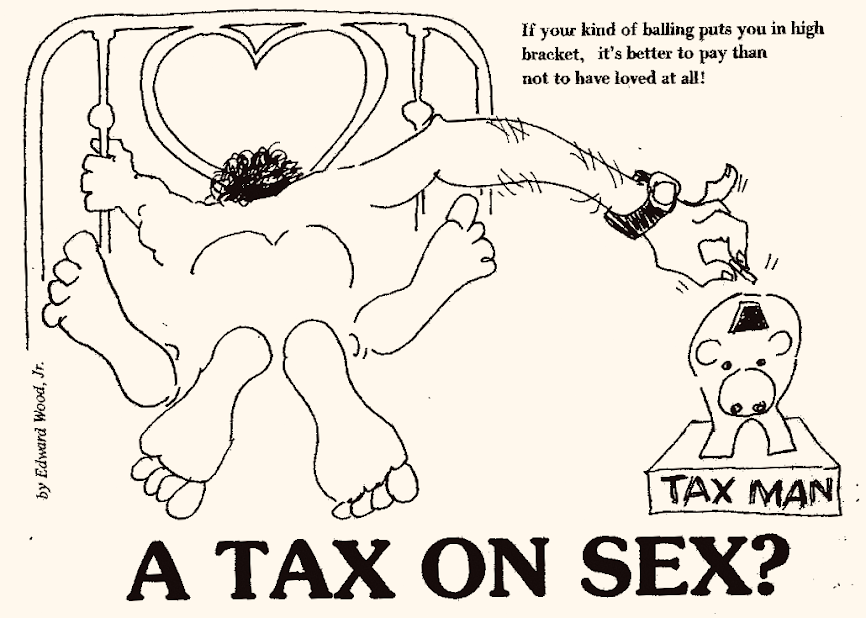 |
| Ed Wood proudly put his own name on this one! (Illustration from Ace magazine.) |
NOTE: This article continues my coverage of Ed Wood's When the Topic is Sex (BearManor Media, 2021).
The article: "A Tax on Sex?" Originally published in Ace (Four Star Publications), vol. 20, no. 1, February 1975. Credited to Edward Wood, Jr.
 |
| The Ace magazine where Ed's article appeared. |
Excerpt: "There are times when it only takes a small and simple idea to be studied and the simple idea becomes a nationwide happening. There is always someone in the government who is looking for the new tax dollar whether or not the public can afford it. However Mr. Porter doesn't complete his article on such a high note. The realization of problems are clear in his mind. He puts the problems down for study, as well as the general well being of his proposition."
Reflections: Among the pieces in When the Topic is Sex, "A Tax on Sex?" stands out for a number of reasons. For one thing, it was published in 1975, making it one of Ed Wood's later magazine articles in this collection. Secondly, he wrote it under his own name rather than anonymously or pseudonymously. That's not unheard of, and there have been other such examples in this book, but it's still relatively rare. Thirdly, it was written for an adult magazine called Ace, which was outside of the Pendulum Publishing family for whom Ed typically worked in the 1970s.
Those oddities aside, "A Tax on Sex?" finds Ed Wood up to his old tricks. Once again, he's blatantly recycling material from another writer—in this case, an editorial written by Harold T. Porter (identified as the "business manager for the New Orleans public schools") for the American School Board Journal suggesting that a tax be levied on sex to fund the educational system. Try as I might, I cannot find the original article, but both the Journal and Mr. Porter are quite real, so I have no doubt of the editorial's authenticity. Whether it was intended seriously or satirically, I do not know. I also have no idea how something from the American School Board Journal ever came to Ed Wood's attention in the first place.
However this article came about, its premise is fairly simple. The government always needs more money, and everything else has been taxed. Why not sex? Ed Wood discusses the pros and cons of this radical idea, including the problems of implementation and enforcement, but nearly everything he has to say about it is pilfered from Harold T. Porter, who is quoted throughout the body of the article. Ed does find a few ways to sneak in his own obsessions, namely his fixation on death. Dig the opening paragraph:
The tax issue starts even before you are born and doesn't even end once you have shuffled off this mortal coil. The graveyard may take your body, but the government is right around to make sure that the old clay pays the dues. There is the inheritance tax. Funeral directors collect their fee plus a tax... the grave opening at the cemetery... taxes ... taxes ... taxes ...
So Eddie kicks off an article called "A Tax on Sex?" by talking about graveyards, funeral directors, cemeteries, and mortal coils. You'll notice he manages to work in a few of his trademark ellipses, too. The period key on Ed's typewriter must've been worn out.
Naturally, I have to mention that this same exact idea was the basis for a sketch on the September 22, 1970 episode of the classic British comedy series Monty Python's Flying Circus. In the Python version, the politicians act like overgrown children who cannot bring themselves to say "sex" and instead refer to it as "thingy." One committee member played by Terry Jones explains his rationale for the new tax: "Most things we do for pleasure nowadays are taxed, except one. Smoking's been taxed, drinking's been taxed but not... thingy." It takes the other dimwits a few moments to catch on, but they finally get it. "Well it'll certainly make chartered accountancy a much more interesting job," declares Eric Idle.
Next: "Who Wants to Get Involved" (1972)

No comments:
Post a Comment